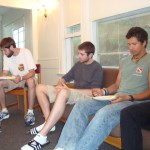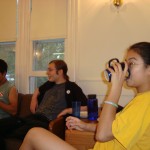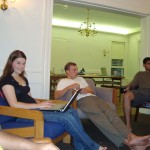The First Reeder Fellows Discussion of the Fall 2009 Semester
I THINK. I ADAPT. I EVOLVE

Date: September 8th, 2009
Time: dinner at 6pm, discussion starts at 6.30pm
Please RSVP at hasegand@lafayette.edu at least 12h in advance if you are coming to dinner too so we can make sure we have enough food for everybody.
Location: Reeder Fellows House Lounge
Don’t know how to find us? Here‘s something to help you.
TOPIC: I think. I adapt. I evolve
Charles Robert Darwin (1809 – 1882) was an English naturalist who realised and presented compelling evidence that all species of life have evolved over time from common ancestors, through the process he called natural selection. The fact that evolution occurs became accepted by the scientific community and much of the general public in his lifetime, but it was not until the emergence of the modern evolutionary synthesis from the 1930s to the 1950s that a broad consensus developed that natural selection was the basic mechanism of evolution. In modified form, Darwin’s scientific discovery is the unifying theory of the life sciences, explaining the diversity of life.
How did the theory of evolution changed the way we see ourselves as a species?
And how about influence on the purpose of our lives?
How can we reconcile the theory of evolution with the religious faith?
Sources of information:
- The Linean Society of London: Darwin-Wallace Paper Website. PDF.
- Charles Darwin Wikipedia INFO
- “TED2008: What is Life?”. Unedited running notes from the TED2008 conference in Monterey, California. Third session
- Pondering Evolution is Life Changing by David Sunderlin
- VIDEO: Darwin’s Theory is fundamental to biological research at scientific institutions
- Darwin’s Legacy – William Durhan’s Course from Stanford




Interesting topic, and these questions are truly worth asking.
To the first question, I think the modern theory of evolution was a shocking revelation to many because it challenged our image of the human as a unique entity. We’re used to dividing our world between the human and the natural; zoos, parks, and property rights for a few examples. If we understand that we’re a part of the same community (genetic and geographic) as the rest of the natural world, the human race would act very different on many different policies (natural resource management, city planning, urban expansion, etc.).
I’ll skip the next question for now, since the last seems more pertinent to answer first. There is no way to evenly reconcile religious faith and evolution. Scientifically based theories leave no room for argument except on scientific grounds. Religious arguments, on the other hand, are not excepted from scientific truths. So, to reconcile the two is really to reconcile just the religious beliefs, since they can be changed with no correlated change in reality but a change in the accepted theory of evolution would/could contradict what we know and see as truth (lowercase t).
In that respect, if a person gets their “purpose” in life from religious doctrine, it may have to change drastically to accommodate the modern theory of evolution. However, should someone draw upon a more tangible purpose, I think evolution would be a wonderful tool to use. It allows for an amazing way of viewing the world as a whole, and still understanding all of its parts. We, respectfully, “mean” nothing as an individual, less you count the procreation of a species as “good.” Evolution does not decipher human morality; it does not offer a guide for right or wrong. It is simply a general statement about what is, what was, and what can be for life on earth. It is beautiful, but it is not an “answer” for anything. In my mind, there is plenty of room for faith in whatever flying spaghetti monster you want… though some religions simply can’t make room for evolution.
Pity that. Perhaps, in time, those antiquated philosophies will stop trying to answer questions that science can answer. If they can’t change, maybe someday they’ll simply drive themselves to extinction. Or, if they find a way to evolve and incorporate our new understanding of the world, they could produce an entirely new, exciting faith. Perhaps along the lines of Unitarian Universalism or Deism… but certainly NOT Scientology.